UCSB Hist 133C,
L 17:
Confronting the Nazi Past, 1960s-1980s
by Prof. Marcuse, Feb. 13, 2004
How did and does the Nazi past shape German political culture
(continued from L16)
- 1960s: Detatched learning
- 1970s: Overcoming Mythic Ignorance
- 1980s: Overcoming Mythic Victimization
- Q6 & discussion of The Reader (handout)
Anamnesis: recovering memory
- 1955: return of POWs after Adenauer's Moscow trip: removes major cause of
victimization (Berlin Wall puts it back)
- 1957: The Ulm Task Force trial-- first major trial by W. Germany->Ludwigsburg
institute
- 1961, Israel: The Eichmann Trial-- Int'l media event; educational-legal
- 1963, Frankfurt: The Auschwitz Trial-- Schlink's generation learns
- 1970, Warsaw: Willy Brandt knealt; "traitor" in 1940s; Berlin; Ostpolitik;
acknowledges victimhood of Jews
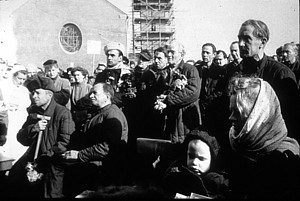
Waiting for POWs to arrive in Friedland, 1955 |
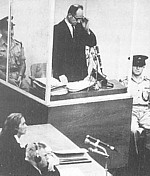
Eichmann on trial in Jerusalem, 1961 |
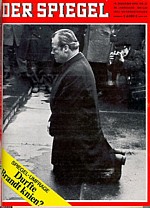
Dec. 1970 cover of Der Spiegel showing Brandt in Warsaw |
The 1960s
1960s: learning & outrage about Nazis, but little emotional connection
(abstract "fascism")
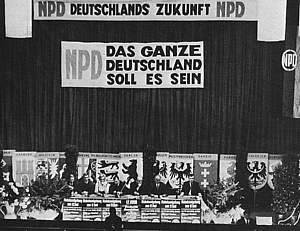
1967 NPD party congress |
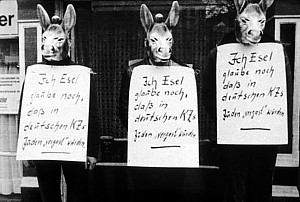
1974: Holocaust deniers in Hamburg |
The demise of the 3 myths, 1
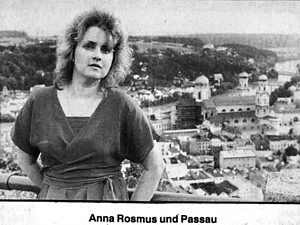 1970s:
end of ignorance--older generations admit knowledge
1970s:
end of ignorance--older generations admit knowledge
- 1970 Brandt in Warsaw
- 1974-6 "Hitler Wave" (film, surveys)
- 1979 broadcast of US TV miniseries "Holocaust," followed by national
history prize; 1989 film "Nasty Girl" (imdb,
many reviews)
- detailed knowledge, but victimhood possible
The demise of the 3 myths, 2
1980s: end of victimization
1980s: Differentiation
Dachau memorial symbols for homosexuals: 1968, 1985, 1995
Schlink: Discussion & Q6
- e-mail notification of web site updates: link & instructions on website
- Q6: Name 3 situations in which Hanna's choice to keep her secret secret
determined the course of her life
- Discussion of Schlink: The Reader (handout)
page by H. Marcuse, prepared for web Feb. 17, 2004
back to top, to previous lecture
16, next lecture 18, UCSB Hist
133c homepage








 1970s:
end of ignorance--older generations admit knowledge
1970s:
end of ignorance--older generations admit knowledge